It’s been awhile since I’ve done a book blog. Here are some of the books I’ve read over the past couple months.
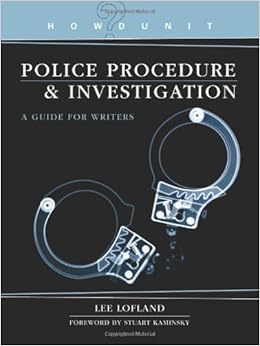 Lee Lofland, Police Procedure and Investigation: A Guide for Writers (Writer’s Digest Books, 2007). Written by a cop turned writer, this is a fascinating look at how police officers are trained, what they do, and how they think. Lofland overturns a number of myths (like cops shooting to wound, or firing warning shots, or going through the Miranda routine as they cuff someone). As Americans continue to wrestle with issues surrounding law enforcement and race, we would do well to understand the basic of how things work (or are supposed to work). The chapters on the police academy, officer equipment, and search and arrest procedures were especially helpful.
Lee Lofland, Police Procedure and Investigation: A Guide for Writers (Writer’s Digest Books, 2007). Written by a cop turned writer, this is a fascinating look at how police officers are trained, what they do, and how they think. Lofland overturns a number of myths (like cops shooting to wound, or firing warning shots, or going through the Miranda routine as they cuff someone). As Americans continue to wrestle with issues surrounding law enforcement and race, we would do well to understand the basic of how things work (or are supposed to work). The chapters on the police academy, officer equipment, and search and arrest procedures were especially helpful.
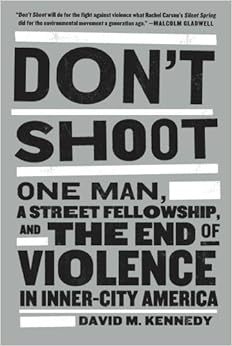 David M. Kennedy, Don’t Shoot: One Man, a Street Fellowship, and the End of Violence in Inner-City America (Bloomsbury, 2011). Read this book. I doubt anyone will agree with everything in the book, but I’d be surprised if someone can’t learn anything from it. In my case, with little education and even less experience regarding violence in inner-city America, I felt like I was learning on every page. I hope to write a longer review in the weeks ahead. For now I’ll just say that the chapter “Across the Race Divide” helped me understand why my Black brothers and sisters are so wary of law enforcement in this country and why those Christians I know on the law enforcement side are so upset when they get painted as the bad guys. Kennedy’s book is part memoir, part sociology, and part activism. His analysis makes a lot of sense to me.
David M. Kennedy, Don’t Shoot: One Man, a Street Fellowship, and the End of Violence in Inner-City America (Bloomsbury, 2011). Read this book. I doubt anyone will agree with everything in the book, but I’d be surprised if someone can’t learn anything from it. In my case, with little education and even less experience regarding violence in inner-city America, I felt like I was learning on every page. I hope to write a longer review in the weeks ahead. For now I’ll just say that the chapter “Across the Race Divide” helped me understand why my Black brothers and sisters are so wary of law enforcement in this country and why those Christians I know on the law enforcement side are so upset when they get painted as the bad guys. Kennedy’s book is part memoir, part sociology, and part activism. His analysis makes a lot of sense to me.
 Greg McKeown, Essentialism: The Disciplined Pursuit of Less (Crown Business, 2014). As always, business books like this must be read with a discerning eye. I find that best-sellers in the “personal success” genre are almost always long on over-simplification and short on gospel wisdom. This doesn’t mean they are useless. Far from it. Maybe it’s just an indication that I’m still learning the lessons from Crazy Busy, but I appreciated the relentless reminder to find what is most important, focus on this one thing, and say no to almost everything else.
Greg McKeown, Essentialism: The Disciplined Pursuit of Less (Crown Business, 2014). As always, business books like this must be read with a discerning eye. I find that best-sellers in the “personal success” genre are almost always long on over-simplification and short on gospel wisdom. This doesn’t mean they are useless. Far from it. Maybe it’s just an indication that I’m still learning the lessons from Crazy Busy, but I appreciated the relentless reminder to find what is most important, focus on this one thing, and say no to almost everything else.
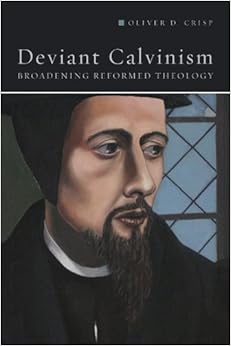 Oliver Crisp, Deviant Calvinism: Broadening Reformed Theology (Fortress Press, 2014). I already wrote a longer review; here was my conclusion: “This is not the first book I’ve read by Oliver Crisp, nor will it be the last. Even when exploring ‘liminal places,’ his theology is deeply informed by and respectful of the Reformed tradition. This work is no exception. The history is informative, the breadth of knowledge striking, and the arguments provocative. One can learn much from this book. My main complaint is that in the two instances meant to make the case for ‘deviant Calvinism,’ the first example (libertarian free will) is not really Calvinist and the second example (hypothetical universalism) is not all that deviant.”
Oliver Crisp, Deviant Calvinism: Broadening Reformed Theology (Fortress Press, 2014). I already wrote a longer review; here was my conclusion: “This is not the first book I’ve read by Oliver Crisp, nor will it be the last. Even when exploring ‘liminal places,’ his theology is deeply informed by and respectful of the Reformed tradition. This work is no exception. The history is informative, the breadth of knowledge striking, and the arguments provocative. One can learn much from this book. My main complaint is that in the two instances meant to make the case for ‘deviant Calvinism,’ the first example (libertarian free will) is not really Calvinist and the second example (hypothetical universalism) is not all that deviant.”
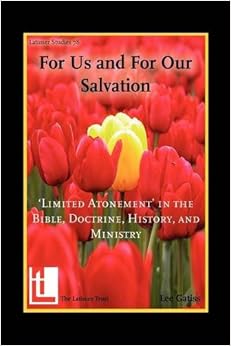 Lee Gatiss, For Us and For Our Salvation: ‘Limited Atonement’ in the Bible, Doctrine, History, and Ministry (The Latimer Trust, 2012). A brief book filled with excellent work in each of the categories mentioned in the subtitle. This is a thoughtful, learned, and readable introduction for anyone trying to sort through the questions “For whom did Christ die?” and “What did Christ’s death accomplish?”
Lee Gatiss, For Us and For Our Salvation: ‘Limited Atonement’ in the Bible, Doctrine, History, and Ministry (The Latimer Trust, 2012). A brief book filled with excellent work in each of the categories mentioned in the subtitle. This is a thoughtful, learned, and readable introduction for anyone trying to sort through the questions “For whom did Christ die?” and “What did Christ’s death accomplish?”
 Gary Steward, Princeton Seminary (1812-1929): The Leaders’ Lives and Works. I love to read about Old Princeton. Here’s my blurb for the book: “Gary Steward is to be commended for providing an intelligent and edifying introduction to the theology and leaders of Old Princeton. Part biography and part doctrinal exploration, this volume can be profitably used both by those familiar with the Alexanders and Hodges and by those meeting them for the first time. The tone is warm and balanced, the content rich and accessible, this historical work careful and illuminating. I hope pastors, students, and anyone else interested in good theology and heartfelt piety will ‘take a few classes’ at Old Princeton. This book is a tremendous resource toward that end.”
Gary Steward, Princeton Seminary (1812-1929): The Leaders’ Lives and Works. I love to read about Old Princeton. Here’s my blurb for the book: “Gary Steward is to be commended for providing an intelligent and edifying introduction to the theology and leaders of Old Princeton. Part biography and part doctrinal exploration, this volume can be profitably used both by those familiar with the Alexanders and Hodges and by those meeting them for the first time. The tone is warm and balanced, the content rich and accessible, this historical work careful and illuminating. I hope pastors, students, and anyone else interested in good theology and heartfelt piety will ‘take a few classes’ at Old Princeton. This book is a tremendous resource toward that end.”
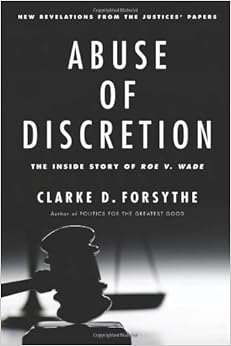 Clarke D. Forsythe, Abuse of Discretion: The Inside Story of Roe v. Wade (Encounter Books, 2013). Based on a quarter-century of research, Forsythe offers an impressive, if at times disheartening, look at the legal, personal, and cultural issues that led to the legalization of abortion in America. Without ever sounding shrill, cantankerous, our alarmist, Forsythe explores a number of medical myths and judicial irregularities surrounding Roe. If you think Roe was a mistake, you should probably read this book. If you think it wasn’t, you definitely should.
Clarke D. Forsythe, Abuse of Discretion: The Inside Story of Roe v. Wade (Encounter Books, 2013). Based on a quarter-century of research, Forsythe offers an impressive, if at times disheartening, look at the legal, personal, and cultural issues that led to the legalization of abortion in America. Without ever sounding shrill, cantankerous, our alarmist, Forsythe explores a number of medical myths and judicial irregularities surrounding Roe. If you think Roe was a mistake, you should probably read this book. If you think it wasn’t, you definitely should.

















